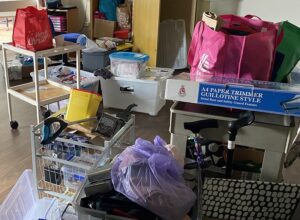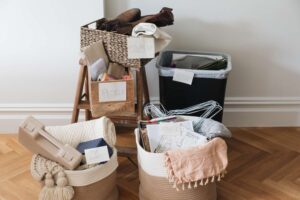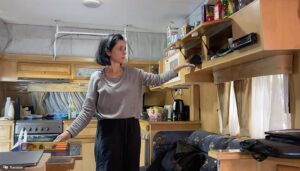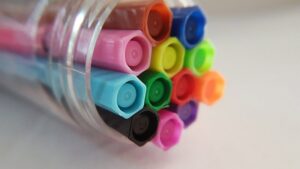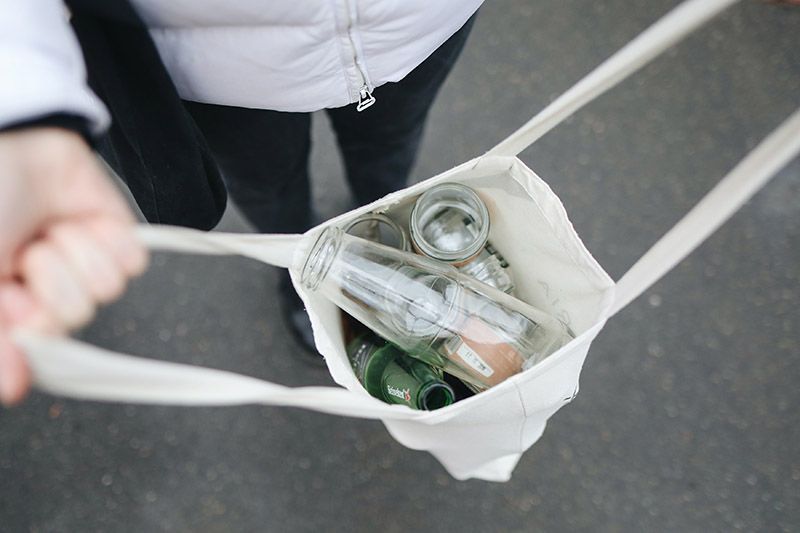
Firstly, don’t rush. Haste can result in throwing everything in the bin, which is not ideal. We want to re-house as much as possible.
Sustainable Decluttering – divide and conquer
Hopefully, you are already separating your household recyclables from rubbish.
And you can take it a step further by investigating what else is recyclable in your local area.
My council recycling centre (tip) recycles metal, X Rays, paint, E-Waste (anything with a cord or battery), paper/cardboard and batteries. Some centres recycle polystyrene, CDs, soft plastics and more.
Officeworks takes pens and markers, and bless ’em, they don’t make you go deep into the store to do it. There is a hub in the foyer of most stores.
Fabrics and unwearable clothes can go to programs like Upparel, or even be taken to H&M retail shop for recycling.
Look at the Tread Lightly program to donate unwearable shoes.
More info about specific types of recycling is here. (scroll to bottom)
Sustainable Decluttering – donate
Stuffing everything into donation bins is not ideal. Op shops discard a large percentage of donations which are not fit for sale. Even if deemed saleable, some items come off the shelf after a period of inactivity.
A more direct approach to finding the right custodian for your item, is to advertise it free in your local community, Buy Nothing or Good Karma Facebook group. This is not practical for every tiny thing you want to donate, but clothing bundles for a certain size, and bigger items which photograph well can be easily advertised. This idea is also great for items the op shops cannot take, such as building materials, food and toiletries. And if it’s a local group (rather than Marketplace at large), there are fewer pickup kms for the recipient.
Putting donations on the kerb or outside your house as freebies can work well, but:
– Check the weather first, and keep an eye on it. Ruined items are no good for anyone.
– Present your items well. People are more likely to stop if things look neat and appealing. A tidy box of books with spines facing up will attract more passersby than a pile of tangled clothes on the grass. Your neighbours may not want to rummage.
– Be prepared to retrieve anything remaining in a day or so, and take it to the op shop or recycling centre.
There is a more detailed post on donations here.
Sustainable Decluttering – organising products
Although tempting, it’s wasteful to bulk-buy shiny new containers. The big tubs with lids have a very limited lifespan, especially if stacked.
Even the smaller ones you may deem necessary can easily be substituted with shoeboxes, smartphone boxes, excess Tupperware and other items you have lying around.
Chemists often have lovely surplus cardboard boxes with lids, which they can give you.
But more importantly, your decluttering will hopefully mean you don’t need many organising products at all. You are aiming to remove, not add.
Sustainable Decluttering – lifestyle
Think about what you can live without. Home printers for example, are an environmental curse due to their limited lifespan and compatibility, and their use of ink cartridges. If you barely use a printer, ask a friend or the library for the occasional output.
Also reconsider niche devices that are gathering dust. Massage and sports equipment, kitchen gadgets, power tools – the list goes on. You don’t need to own everything you will ever use. Making do, hiring, and borrowing from friends means less stuff in the world.
Sustainable Decluttering – repair, reuse, upcycle
Do a course on mending, join a men’s shed, or find locals who can help out. If you love something and it’s fixable, fix it.
This also works for things you are donating. Items in useable condition are less likely to go to landfill.
Sustainable Decluttering – digital rather than physical
Can you go paperless? Ditch the diaries and photo albums, and store things online. Get rid of CDs and movies, and use streaming services. E-readers mean no more physical books. All those brochures and business cards can come off the fridge and be stored online in your internet browser as favourites. You can also take photos of memorabilia and get rid of the bulky originals.
Sustainable Decluttering – say no to consumerism
Prevention is better than cure. We are surrounded by marketing, and get a dopamine hit from making a purchase, but we CAN say no to consumerism.
If you didn’t know you needed it before you saw it, you don’t need it. Stay away from temptation, out of the shops and off the shopping websites. Remember – you are enough. As you are!
Sustainable Decluttering – in summary
Decluttering doesn’t have to be a wasteful exercise. We can minimise environmental impact by donating and recycling thoughtfully. And if something you own is truly landfill, living with it doesn’t make it any more useful.










